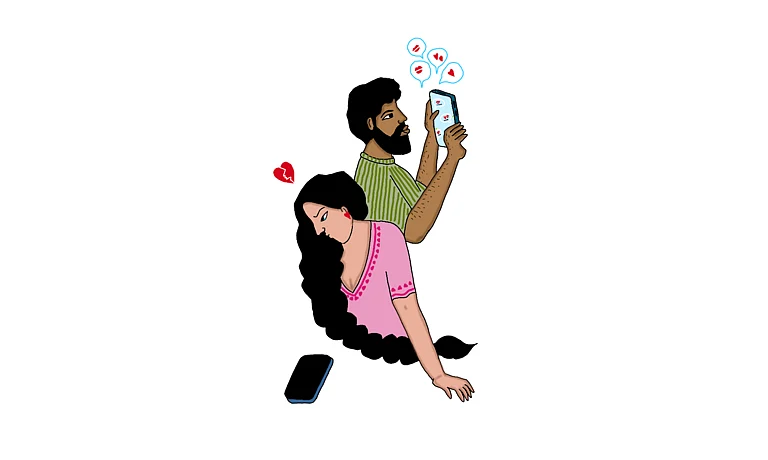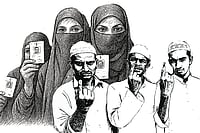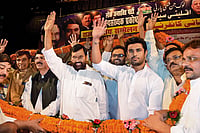It is the geography of hate, with its potential to knock off the very core sensibilities of the humane self, which is now becoming all pervasive. Hate mixed and stirred with rage, is the new toxic dram, served socially in the militant-religious-nationalist chalice by a group of people, who swear by the ideology of bigotry and hate, and seek to constitute India into anything but a secular, democratic and republic nation. Or, into anything, but a gender-just society. Hate is omnipresent, ominously scratching the inane human emotions, to engender barbarism.
What more obscene could be to witness the ‘auction’ of Muslim women online without their knowledge? Last year, some five months back, photographs of over 80 Muslim women—mainly students, journalists and activists—were uploaded on an app called ‘Sulli Deals’, and it came as a shocker for them to find themselves being traded brazenly. The platform represented a market site to buy a ‘Sulli’—an abusive word for Muslim women—as ‘deal of the day’. It led to public outrage and complaints to police, and GitHub, which hosted the app, pulled the platform down, but unsurprisingly no attempts were made by police to nab the offenders. In the most despicable manner, we witnessed, Muslim-Indian-women transmogrified into online hookers, and certain sections of media made a lavish spectacle out of it.
ALSO READ: Total Eclipse Of The Heart
The new year of 2022 began with the repeat of this abominable act of ‘sulli deals’, though this time the app name was changed to ‘Bulli Bai’ deals, unsurprisingly on the same GitHub platform. The coinage of words ‘Sulli’ and ‘Bulli’ that rhymes with ‘Mulli’—an invective used for Muslim women, like ‘katua’ is used for Muslim men—was to shame and dehumanise women of the community. Again, about 100 Muslim women, including young and old, and some being very strong voices in the public sphere, were exhibited on the same online platform as ‘deals of the day’. Again, there has been public outrage and police complaints, and, again GitHub, the hosting platform, has pulled it down. But this time, surprisingly, police acted swiftly and nabbed the culprits involved in both the deals.
Emasculation of women’s bodies
There are several questions, given the background of the sales, which rankles one’s mind. Why are women, who have toiled hard to have their own agency, and their bodies targeted in public? Isn’t the ‘deals’, Sulli and Bulli, to emasculate their bodies so that they lose their agency?
ALSO READ: ‘Laab’ In The Mountains
Sometime back, a few critical voices in journalism, particularly women, were abused as ‘presstitutes’, a disingenuous way to shame and slander them. The women activists, journalists, students, lawyers, who debate power and register truth to power, seldom acquiesce to the patriarchal social norms, rather they question and challenge it. The strong women leaders, protesting against rape or domestic violence, demanding gender-justice, become eyesore for those who do not want any disruption in the social order. Working women are seen as threats to the patriarchal social set-up and, therefore, are hated by those men who see their power and privileges, as essentially masculine commodities, being eroded, and by those women who are imbued with their own lack and inferiority. With largescale trolling, harassing and shaming of working women through memes, jokes and stereotyping on social media, can we infer that gains in women’s status vis-à-vis men may indeed provoke a backlash? Is it the ‘economic emasculation’ of men that renders ‘bodily emasculation’ of women and thereby violence on them? Auctioning of women’s bodies renders women as products, and the auctioneers understand women only as a sexed-up body with less or perhaps no brains. The auctioneers, and their surrogates, derive some sort of sadomasochistic pleasure and are the real harbingers of hate.
Communalising Gender
Both the ‘Sulli’ and ‘Bulli’ deals were targeted against Muslim women, majorly vocal women, and neatly excluding other religious categories. The deals appeared to be a meticulous stratagem to rip-off the dignity and womanhood of Muslim women. But the nub is, why Muslim women? Of late, communalism has taken deep roots into our bones. The communalists and bigots as hate-mongers and advocates of violence see themselves as part of communities that, they claim, are vulnerable and under siege from belligerent others and secularists.
The recent open call for genocide against Muslims, which also includes women, at a dharam-sansad meeting testifies that democratic politics in India has regressed into a nonsensical experience, a theatre of absurd, vacuous, and into scripted and staged communal hate and violence. Such calls bolster communalism and give sinews to structural hate and violence present in our society, and it is women who at the end of the day have to suffer most. Feminists, both women and men, must resist communalisation of public space as it pushes women first, then others, out from public into private, perhaps into the ‘drudgery of kitchen’. The Sulli-Bulli deals otherise Muslim women, one of the most marginalised sections in general, into a derogatory-alien object, and under the influence of religious-nationalism attacks their agency.
Way Forward
Feminist movement, at the moment, seems to be stuck around the complexities of intersectionality. Not much critical inquiry and critical praxis is informing the movements. Intersectionality, more than a tool to understand interlocking oppression, should be applied as a social-justice construct. Somehow, we see that the gender question gets subordinated by the putative larger questions of nationalism, religion, privatisation and so on, or by several axes of social division. We need to propose how things ought or ought not to be, keeping in mind the resistance to power and privileges that patriarchy unabashedly hands it over to both men and women patriarchs. In essence, feminists need to strike at the core of hate structures.
(This appeared in the print edition as "Dealing in Hate")
(Views expressed are personal)
ALSO READ
Tanvir Aeijaz teaches public policy and politics at University of Delhi, and is an honorary Professor Extraordinary at Stellenbosch University, South Africa



























